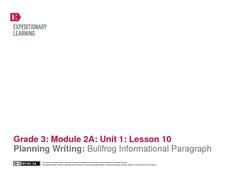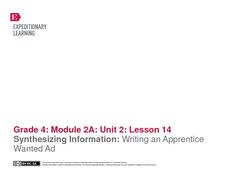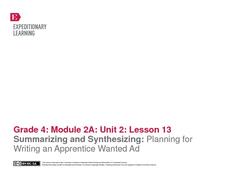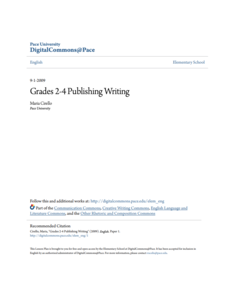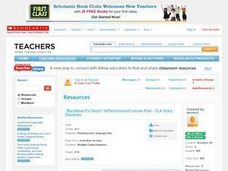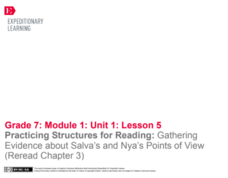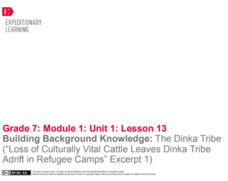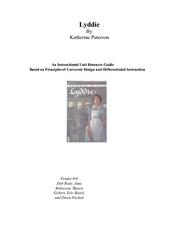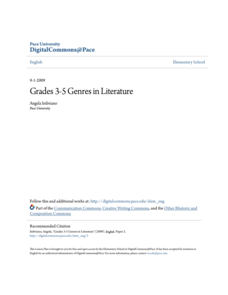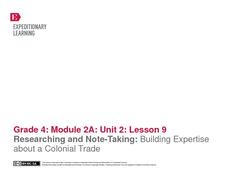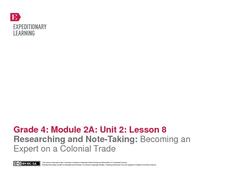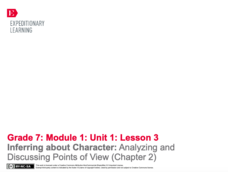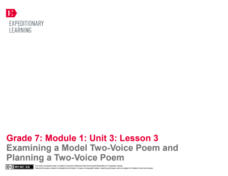EngageNY
Planning Writing: Bullfrog Information Paragraph
Lesson ten in this unit for the book Bullfrogs at Magnolia Circle, prepares third graders to begin writing an informational paragraph about the adaptations of bullfrogs. First, young writers work either independently or in pairs to...
EngageNY
Synthesizing Information: Writing an Apprentice Wanted Ad
Fourth graders view examples of help-wanted ads as they plan and create their own writing in the fourteenth instructional activity of this unit on colonial trade. The engagement of the class is captured when the teacher shares an actual...
EngageNY
The Painted Essay for Opinion Writing: Developing a Conclusion and Adding Linking Words
Let's get colorful! Scholars use the Painted Essay technique to analyze and color code the conclusion of a model essay. Working in small groups, pupils then write a conclusion paragraph for their draft editorials about offshore drilling.
EngageNY
Summarizing and Synthesizing: Planning for Writing an Apprentice Wanted Ad
In instructional activity 13 of this unit on colonial trade, young researchers learn about apprentices as they prepare to write help-wanted ads for the specific trade they have been researching. To begin, the class listens closely as the...
Pace University
Publishing Writing
Scholars become familiar with tagline literature with the help of the story, Alexander and the Horrible, No Good, Very Bad, Terrible Day by Judith Viort. After a read-aloud and whole-class discussion, leveled groups complete several...
EngageNY
End of Unit 2 Assessment: Working with Two Texts - Reading, Listening, Summarizing, and Synthesizing
As a summative assessment for this unit on colonial trade, fourth graders listen to and read informational texts in order to demonstrate their ability to take notes, write summaries, and draw connections. Young scholars first listen as...
Curated OER
"Blackbeard's Ghost" Differentiated Lesson Plan
Develop a better understanding of "Blackbeard's Ghost" with this differentiated activity. Working in groups on a creative project, middle schoolers can reinforce their reading comprehension and literary analysis skills. Use this activity...
Virginia Department of Education
Revising Writing
Junior high writers investigate other student’s sample writing and critique on how it could be improved. Skill emphasis is place on elaboration, voice, and sentence variety. The student writing is provided, but the checklist for revision...
EngageNY
Practicing Structures for Reading: Gathering Evidence about Salva’s and Nya’s Points of View (Reread Chapter 3)
How does an author develop and contrast character points of view in a work of literature? Using a graphic organizer, readers continue gathering evidence about character point of view from Linda Sue Park's A Long Walk to Water. Next,...
EngageNY
Building Background Knowledge: The Dinka Tribe (“Loss of Culturally Vital Cattle Leaves Dinka Tribe Adrift in Refugee Camps” Excerpt 1)
Text annotations help readers track essential ideas. Pupils continue reading and annotating an informational article about Sudanese tribes, connecting it with A Long Walk to Water by Linda Sue Park. They also begin writing about their...
EngageNY
Analyzing Character: Who is Lyddie?
Character analysis can help readers feel more connected to a literary text. Scholars explore the topic by writing an acrostic poem about the main character from Katherine Paterson's novel, Lyddie. Then, pupils watch a short video to help...
Curated OER
Lyddie: An Instructional Unit Resource Guide
Katherine Paterson’s young adult novel Lyddie is the foundation of a differentiated instruction unit that not only explores the rise of industrialization and labor but women’s rights issues as well. After learners read the novel, they...
EngageNY
Mid-Unit 2 Assessment: Inferring About the Silversmith Trade in Colonial Times
The seventh lesson plan in this unit on colonial trade assesses fourth graders' ability to use details from an informational text to make inferences and create a piece of informative writing. The included assessment begins with learners...
Pace University
Genres in Literature
Enthusiastic readers take part in a book club unit that focuses on genre, particularly historical fiction, fantasy, and adventure. Over the course of 10 days, groups read a variety of stories and choose leveled activities from a learning...
EngageNY
Researching and Note-Taking: Building Expertise about a Colonial Trade
Building on the previous activity in this unit on colonial trade, the ninth activity has young experts continuing their research and writing summaries of the information they find. To begin, children participate in guided practice where...
EngageNY
Continued Close Reading of Bullfrog at Magnolia Circle: Text-Dependent Questions and Vivid Words and Phrases
In the third activity from this unit based on the book Bullfrog at Magnolia Circle, learners focus on using specific details from the text-to-answer questions about the habitat of bullfrogs. While reading the text, young scholars are...
EngageNY
Researching and Note-Taking: Becoming an Expert on a Colonial Trade
Fourth graders work in small groups to become experts on different colonial trades in the eighth instructional activity of this unit. Working toward the long-term goal of writing a piece of historical fiction, young scholars read...
EngageNY
Close Reading of Bullfrog at Magnolia Circle: Main Ideas about the Bullfrog
As your class reaches the end of the book Bullfrog at Magnolia Circle, the seventh lesson in this literary unit helps third graders transition from reading narrative to expository writing. Scholars develop their note-taking skills as...
Curated OER
Express Yourself Lesson Seed 12: Story Event
Focus on plot and the impact-specific events in The Cay. Class members use their double-entry journals, created in a previous lesson in this series, to record their thinking about the guiding question as they read chapters 15 through 17....
August House
The Magic Pot
The Magic Pot by Patricia Coombs is the theme of this multidisciplinary lesson plan. Early readers first take part in a read aloud and grand conversation about the story's details. Then, they get to work practicing their skills in...
Curated OER
Ethos, Logos, and Pathos in Civil Rights Movement Speeches
Examine three speeches while teaching Aristotle's appeals. Over the course of three days, class members fill out a graphic organizer about ethos, pathos, and logos, complete an anticipatory guide, read speeches by Martin Luther King Jr.,...
College Board
The Departure
Scholars learn about the Hero's Journey as they read Ray Bradbury's "The Drummer Boy of Shiloh." They analyze the story's structure and narrative techniques. Finally, they write summaries of the text's central idea and use their...
EngageNY
Inferring about Character: Analyzing and Discussing Points of View (Chapter 2)
Readers engage in discussion with partners to answer questions about A Long Walk to Water by Linda Sue Park. Next, they complete exit tickets, writing about how the author creates different points of view for her characters.
EngageNY
Examining a Model Two-Voice Poem and Planning a Two-Voice Poem
Successful poetry writing requires three P's: planning, preparation, and practice. Pupils read a model two-voice poem and discuss how the author uses evidence to develop the theme. With a partner, scholars use a rubric to analyze the...


